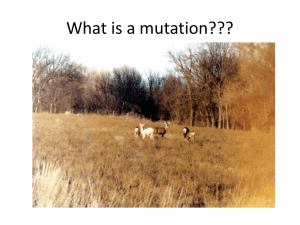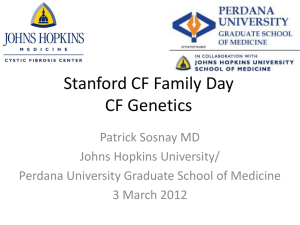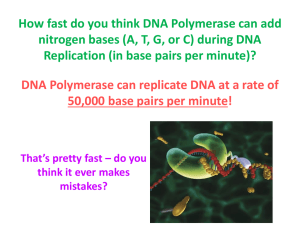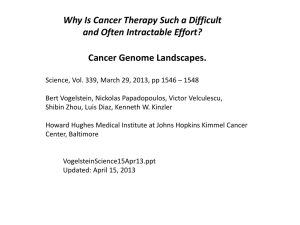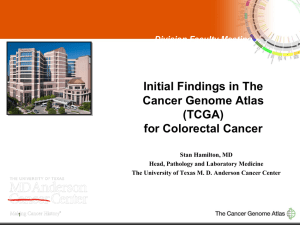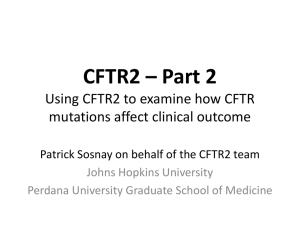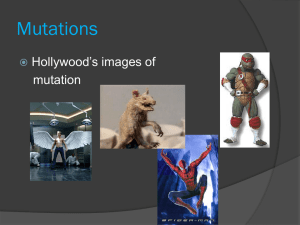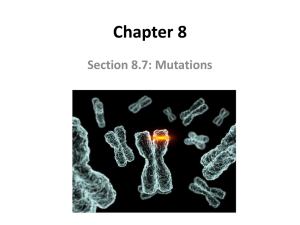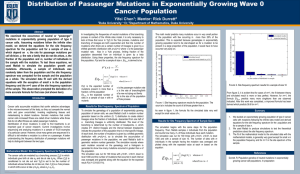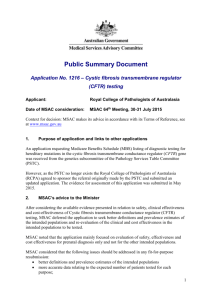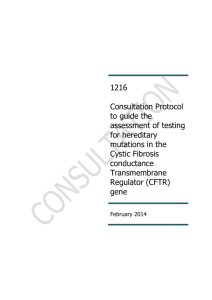PowerPoint Slides
advertisement
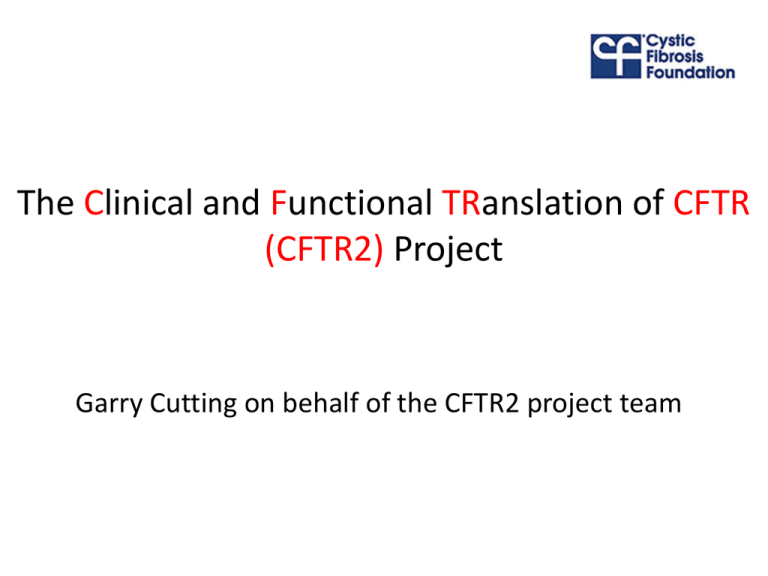
The Clinical and Functional TRanslation of CFTR (CFTR2) Project Garry Cutting on behalf of the CFTR2 project team CF Transmembrane conductance Regulator (CFTR) Serohijos A. W. R. et.al. PNAS;2008;105:3256-3261 CFTRdele 22,23 N1303KD1152HR1077P R117H-5T/7T S1251N 3905insT 711+5G>A G542X DF508 F1074L E60Xp.Phe508del R349L M470V Y569DR668C G551D Q220X V520F P67L P205S 3849+10kbC>T The genetic testing gap Fraction of all mutations reported in the CFTR gene <0.1% Fraction of all mutations that occur in patients with CF 70% Fraction of CF patients with both mutations identified 49% F508del 1.2% 23 ACMG mutations 85% 72% Existing resources for CFTR mutations The Toronto CF Mutation Database • Mutation-driven: Information deposited by genetic laboratories, primarily research Online Mendelian Inheritance in Man (OMIM) • Publication-driven: Information from manuscripts authored by researchers A new repository for clinical data associated with CFTR mutations Gene information CFTR1 (CF Mutation Database) 1893 mutations Link by mutation Clinical information CFTR2 39,545 patients Contributors to CFTR2 Summary of clinical data collected CFTR2 Database 39,545 patients 23 registries/clinics CFTR Genotype Sweat Chloride Concentration 5276 patients with 1 mutation unknown 1674 patients with both mutations unknown 70,466 CF chromosomes with a mutation identified Lung Function (FEV1%predicted) 14,403 patients missing sweat data 250 measurements excluded 24,892 patients 16,204 patients missing PFT data Pancreatic Status 9309 unknown 3 measurements <5 % predicted excluded 23,338 patients 30,236 patients Where did we start? 160 mutations are seen in 9 or more patients in the CFTR2 database • Allele frequency of 0.0001 or .01% • This represents 97% of total identified CFTR mutations How do we determine which mutations cause CF and which ones don’t? Clinical Expert Committee • Christiane De Boeck, MD, PhD - University Hospital of Leuven, Belgium • Peter Durie, MD - Hospital for Sick Children, Toronto, Canada • Stuart Elborn, MD - Queen's University, Belfast, UK • Phil Farrell, MD, PhD – Univ. Wisconsin, USA • Michael Knowles, MD - University of North Carolina, Chapel Hill, USA • Isabelle Sermet, MD, PhD- Necker Hospital, Paris, France Clinically consistent mutation • • • • Elevated sweat chloride concentration Reduced FEV1 % predicted Exocrine pancreatic disease Infection with Pseudomonas aeruginosa • Other features (meconium ileus, male infertility (CBAVD) 2000 Sweat chloride concentrations in 10,108 F508del homozygotes 500 of patients Number 60 mEq/L 0 1000 Frequency 1500 Mean 103 + 16.8 mEq/L 0 50 100 150 Sweat chloride Sweat chloride concentration 200 250 How do we isolate the effect of a mutation in patients that carry two mutations? 7 7 CFTR How do we determine which mutations cause CF and which ones don’t? Clinically consistent mutation Functionally consistent mutation Predicted effect of 160 mutations upon CFTR function Change in one amino acid CFTR Function Expert Committee Margarida Amaral, PhD - University of Lisbon, Portugal Bob Bridges, PhD - Rosalind Franklin University, Illinois, US Gergely Lukacs, MD - McGill University, Montreal, Canada David Sheppard, PhD – Bristol University, UK Phil Thomas, PhD - UT Southwestern, Dallas, US Functionally consistent mutation CFTR procession and function (Fred Van Goor) Fisher Rat Thyroid (FRT) cells expressing CFTR from single cDNA integration Characterize the processing and function of CFTR CFTR processing (Phil Thomas) HeLa transient expressionCell line Site-directed mutagenesis FRT stable expression generation CFTR splicing (Margarida Amaral) mRNA level: Quantitative PCR CFTR Maturation: Western Blot CFTR Function: Ussing Chamber CFTR minigene plasmids HEK293 stable expression CFBE41o- stable expression (planned) FRT(when cell lines created analyzed for 57 missense and 2 deletion mutations In vivo possible) How do we determine which mutations cause CF and which ones don’t? Clinically consistent mutation Functionally consistent mutation Genetically consistent mutation Genetically consistent mutation Fertile fathers of CF patients should carry only one mutation that causes CF Confirm that none of the clinically and functionally consistent mutations occur as the second mutation in a father of a CF patient Mutations occurring in at least 9 patients have a frequency ~0.0012 (9/8400 genes without ACMG mutations) 2000 ‘healthy’ CFTR genes in 2000 fathers provides 80% power to detect variants at 0.002 at type I error rate of 0.05 How do we determine which mutations cause CF and which ones don’t? Clinically consistent mutation Functionally consistent mutation Genetically consistent mutation CF-causing mutation Improving genetic testing for CF Fraction of all mutations reported in the CFTR gene 1.2% Fraction of all mutations that occur in patients with CF 85% Fraction of CF patients with both mutations identified 72% 23 ACMG mutations 8.4% 160 CFTR2 mutations 97% 90% What is the best way to present this information in a public database? CFTR2 Patient Advocacy Committee Barbara Karczeski MS(Genetic Counselor)- Johns Hopkins DNA Diagnostic Lab, Baltimore, MD Michelle Huckaby Lewis, MD, JD (Ethics expert) – Berman Institute of Bioethics/Genetics and Public Policy Center, Johns Hopkins, Baltimore MD Bruce Marshall, MD (CFF representative) - CF Foundation, Bethesda, MD, USA Juliet Page (Patient representative) - Annapolis, MD, USA G551D I148T D1152H Summary • Data from nearly 40,000 CF patients into the CFTR2 database have been instrumental in: – Increasing the list of clinically, functionally and genetically vetted ‘CF-causing’ mutations from 23 to ~160 (more to follow..) – Providing complete CFTR mutation information on 9 out of 10 patients with CF – Creating the infrastructure for new studies into the relationship between CFTR function and the CF phenotype CFTR2 Team Julian Zielenski Vertex Pharmaceuticals and NIDDK R37 DK44003 Thanks to the CF clinical and research community for making this project possible
